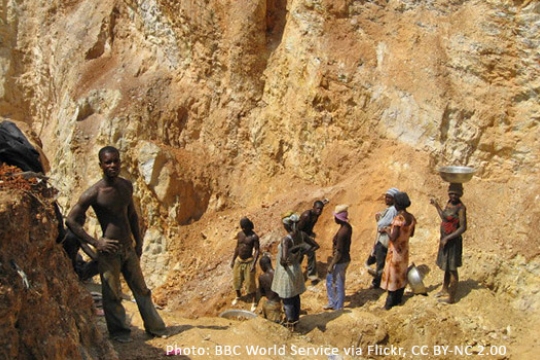Artisanal and Small-Scale gold Mining (ASM) is an important economic activity that has provided jobs and supported the livelihoods of many rural Ghanaian communities for over a century. Mineral sector reforms implemented in the 1980s to attract foreign direct investment into the large-scale mining sector, also saw a marked increase in the contribution of ASM to total gold production, from 2% in 1989 to 41% in 2018. The sector today is a key employer of indigenous labour and helps in the retention of additional revenue within the local and national economy: the economic importance of ASM can, thus, no longer be ignored.
The sector faces some challenges, however. First, 60% of the estimated 1.1 million people engaged in this activity are illegal or unregistered. While a clear formalization process exits, bureaucratic bottlenecks and prohibitive licensing costs drive miners to illegal operations. Other factors, including weak governance institutions and poor enforcement of mining regulations, the use of obsolete and harmful technologies – as a cost-cutting measure by operators – continue to deepen the negative impacts of ASM on the health and lives of operators, and the environment while limiting the benefits.
In order to mitigate the negative impacts and enhance the productivity and environmental sustainability of ASM, and assure maximum outcomes for lives and country, there is the need for effective interventions. But with limited resources, it is important to focus on interventions with potential to yield maximum returns on investment. ENRRI Director Prof Wisdom Akpalu proposes the formalization of mining cooperatives – associations created by miners to support mining activities, from extraction to commercialization of mining products – as a cost-effective means to regulate illegal operations and mitigate its associated negative social and environmental impacts.
Mining cooperatives
In a recent presentation to the Eminent Panel of the Ghana Priorities project, Prof Akpalu outlined the costs and benefits of formalizing mining cooperatives into ASM activities. He concluded that a total investment of GHC 7 billion on this intervention would yield benefits amounting to nearly GHC 8. 3 billion, representing a gain of GHC 1.2 for every GHC 1.00 spent.
Presentation Highlights – the cost and benefits of formalizing mining cooperatives
To make mining co-operatives a part of the formalization of ASM operations in Ghana, the Ministry of Mines, in consultation with the Minerals Commission, can designate an area for small scale mining, especially targeting unregistered miners. Prof Akpalu estimated the need to register 1120 co-operatives in 40 mining districts, each consisting of 590 ASM operators. These co-operative unions would be granted a mineralized land to be mined for five years at a time.
The cost related to the establishment of mining co-operatives includes the cost of setting up and sensitizing mining communities on the opportunities of co-operatives. It also takes into account the operational cost of using improved technologies, as miners switch from manual to mechanized tools. The government would also need to support and incentivize cooperatives by providing grants, which the researchers estimate at GHS 216 million per year. Over 10 years, the total cost of the intervention is GHS 7 billion, borne both by the government and the cooperatives.
As for the benefits, easing the formalization process and constituting co-operatives makes it easier for members to pool their skills and financial resources together, acquire innovative technologies and increase their output and earnings. The use of improved mining methods also promotes cleaner gold production and reduces the significant environmental damages of mining, as well as the risk of accidents, mortality and in-utero exposure to mercury from harmful production practices. Mining co-operatives’ financial model of shared savings can also result in greater capital accumulation, generating total benefits worth nearly GHS 8.3 billion. While the overall cost of this intervention is high, every cedi spent would create 1.2 cedis of social good.
Mining co-operatives are a community-based management strategy that could help legally formalize collective decision-making and sharing of responsibilities and generate significant social returns. Through this intervention, the government can help miners improve their technologies and scale up production while taking better care of their health and the environment.
Ghana Priorities
The Ghana Priorities project is a collaboration between Ghana’s National Development Planning Commission (NDPC) and the Copenhagen Consensus Centre that works to identify the smartest and most cost effective development policies for Ghana.
